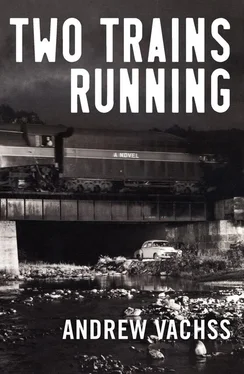“I don’t think so,” Dett said. “Thanks, anyway.”
“Is there anything I can tell you about our town, Mr. Dett? I’ve often said that an establishment like the Claremont should have a proper concierge, but our manager always says he could never find anyone who knows Locke City the way I do,” Carl said, permitting himself a self-deprecating little laugh. “Of course, we have a wonderful kitchen, quite first-class, but the menu isn’t as… varied as some more sophisticated travelers seem to prefer. Especially if you’re going to be with us for-”
“Do you have any Korean restaurants in town?”
“Korean? Well, I must say… that’s the first time I’ve ever been asked that one. I’m sorry to say no, Mr. Dett. We have a number of decent Chinese restaurants, and one Japanese place that just opened, if you are partial to Oriental cuisine, but…”
“How about French?”
“French?” said Carl, ever alert for double-entendre. But an instinct honed over a thousand encounters convinced him there hadn’t been a trace of it in Dett’s question. “I should say so. Chez Bertrand is a lovely place: four stars, without a doubt. Would you like me to make a reservation for-?”
“That doesn’t sound like the sort of place a man goes to alone,” Dett said.
“Well, one never knows,” Carl said, raising an eyebrow a millimeter.
“You’re right about that,” Dett said.
“Very good, sir. You just let me know.”
1959 September 30 Wednesday 19:41
Dett ordered dinner from room service. The steak came medium-rare, as he had requested. The green beans were firm, with a little snap to them as he bit down. The baked potato was in its skin, slit down the center, slathered with butter.
It took Dett more than an hour to finish his meal, washing down each fully masticated mouthful with a measured sip from one of the three Cokes he had ordered.
Dett got to his feet and stood by the window, watching the night. He smoked two cigarettes, spaced twelve minutes apart, cupping his hands each time he struck a match, shielding the red tip in his palm whenever he took a drag.
Glancing at his watch, he emptied what he estimated at about four more shots of the Four Roses into the sink, running hot water behind it. He opened his Pullman, carefully removed the mojo, and transferred it to his smaller suitcase.
Dett put his tray outside the door, hung the “Do Not Disturb” sign over the knob, and turned off all the lights in his room. In the darkness, he removed all the weapons from his overcoat and returned them to their custom housings. He slipped his derringer into the side pocket of a blue denim jacket, worn over a black-and-red lumberjack shirt and faded jeans. On his feet were heavy, rubber-soled electrician’s boots.
Turning the radio dial until he found a station with a mature-sounding DJ, Dett adjusted the volume down to bedside level. He cracked the door, then stepped out into the empty corridor and headed for the staircase.
Dett stepped out the side door on the first floor and into the night. He walked to the pawnshop in under thirty minutes; there he stood in line behind a tired-looking woman and a young man with pronounced hand tremors.
“How late are you open?” he asked the man behind the counter, after the place had cleared.
“Midnights, except for Fridays and Saturdays.”
“You close early then?”
“Don’t close at all then,” the man said, adjusting his eyeshade. “We do some of our best business in that slot. Always got at least one other man with me, sometimes two.”
“If you’re closed when I want to bring the car back…”
“Just park it right out front. Or as near as you can get to it. I live upstairs. And I don’t sleep much.”
“I’m not worried about somebody stealing it, I just-”
“-don’t want it on the street,” the pawnbroker said. “I got it. I’ll take care of it.”
“I only have the one set of keys.”
“I can take care of that, too,” the pawnbroker said.
1959 September 30 Wednesday 22:07
The diner was a chrome-and-glass rectangle, standing in its own glow like a frontier outpost. The parking lot was almost empty, randomly sprinkled with a few cars and a single pickup. Dett backed the Ford into a remote corner, outside the spray of light from the windows.
“He always covers the same route,” Beaumont had told Dett. “But not always in the same order. Thursday nights, he’s going to hit Armand’s place; that’s one we know they’ve cut in on for sure. He’s also got-”
“When you say ‘cut in,’ you mean your people have been cut out?” Dett had interrupted.
“No,” the man in the wheelchair said. “Everyone has to get their jukeboxes from us. That’s the way it’s been ever since… for a long time. Dioguardi’s people, they’ve been collecting a ‘maintenance fee,’ or a ‘service charge,’ or whatever they think is cute. This particular punk, Nicky Perrini, he tells them it’s ‘rent.’ Don’t ask me why.”
The interior of the diner was a reflection of the parking lot-very few people, no two together. The long counter had only three stools occupied. In the booths strung along the windows, two men were working on solitary meals; one was reading a newspaper, the other staring into some private abyss.
No one looked up at Dett’s entrance. He quickly scanned the interior, noting a sign for the restrooms at the extreme left, and took a counter stool a little more than halfway down the right side. A hundred-record Wurlitzer jukebox sat by itself in the corner, a squat chunk of pulsating neon, waiting for an injection of coins to bring it to life.
Dett took a menu from between a pair of chrome napkin dispensers and laid it flat on the counter in front of him. He let his eyes go out of focus, tuning in to his surroundings.
“What’ll it be?”
Dett looked up, saw a short blond woman in a pink waitress’s uniform with a round white collar and matching white bands on the short sleeves. She had a pert face with plump cheeks, her jaw saved from squareness only by a little sheath of flesh. Her eyes were a startling ocean green; they seemed almost absurdly large on either side of her button nose. Below her right eye was a crescent-shaped scar, dull white against her creamy skin, trailing like a permanent tear. Her mouth was small and lightly lipsticked, her lower lip heavier than the upper.
I’ve got much better clothes than these, leaped unbidden into Dett’s mind. Before he could chase the thought, the counter girl said, “What you want is the lemon pie, I bet.” Her smile sunbursted over him. “It’s what everybody comes here for. At least that’s what I tell Booker-he’s the cook, but I’m the one who makes the pies.”
“The lemon pie sounds perfect,” he said, looking down.
“Money back if not satisfied,” the girl said, nodding her head for emphasis. Her tousled blond curls bounced. “A cup of coffee with that?”
“Yes, please.”
Dett watched her as she walked away. Her arms are so round, he thought, but not fat. They look strong. I’ll bet her legs are-
The sound of the door opening behind him broke his reverie. He shifted his position on the stool, covering the movement by reaching for his cigarettes. Dett immediately dismissed the new arrival-an elderly man in an engineer’s cap-and put the pack of cigarettes back into his jacket pocket.
“See if I’m lying,” the counter girl said, sliding a substantial wedge of pie on a heavy white china plate in front of him.
“I know you wouldn’t lie,” Dett said, before he could clamp his mouth down on the words.
“How could you know something like that?” the girl asked, cock-ing her head and putting one hand on her hip. “Are you one of those people who think they can look in your eyes and-?”
Читать дальше












